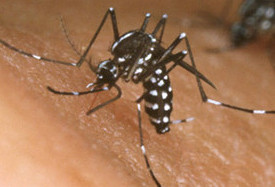WASHINGTON – The mosquitoes are back, and there are more of them than last year.
“The season of terror is underway and about to come on full force,” says Mike Raupp, an entomology professor at the University of Maryland.
The warmer temperatures and spring showers created perfect breeding conditions for mosquitoes, which are developing more rapidly compared to last year’s much cooler spring.
“These last 10 days to two weeks, we’ve been soaring up into the 90s. That cuts in half the gestation time for mosquitoes. So instead of taking two weeks to develop, they’ll complete their development in one week,” he says.
D.C. was ranked third in a list of the worst U.S. cities for mosquitoes by Orkin, a pest control company. Raupp says D.C. has a higher mosquito population because the area has an abundance of standing water and close proximity to parks with lots of trees, which mosquitoes love.
“It is so heavily forested and so many people have gardens. Unfortunately, some of the most egregious mosquitoes, some of the real bad biters like the dreaded Asian tiger mosquito, they breed in these tiny water containers. So here in the District, where people have bird baths and we’re close to Rock Creek Park, these are excellent sites for these urbanized mosquitoes to breed.”
Unfortunately, the mosquitoes are here to stay.
“As long as we continue to have ample rainfall and we continue to have these warm temperatures, there will be blood in the Washington area.”
Repellents
Mosquitoes are attracted to compounds secreted by skin, so covering up is the best way to avoid a bite.
Raupp suggests wearing lightweight, long-sleeved shirts, pants and hats. Sporting goods stores offer specialty clothing.
“You can actually purchase lines of clothing that are pre-treated with repellents that will not only keep off mosquitoes but also keep off ticks,” Raupp says.
But if skin is exposed, using a DEET-based product is the gold standard.
“This is going to provide very long-lasting protection, up to eight hours. If I’m going into a rainforest where mosquito bites are 200 per minute, I’m going to be wearing DEET on my exposed skin,” he says.
For those who prefer not to use DEET, there are alternatives.
“One of my favorites is a compound called picaridin. Picaridin provides very long-lasting protection, six to eight hours. It will work almost as effectively as DEET,” he says.
For those working outdoors just for a few hours, Raupp suggests an organic repellent that contains oil of lemon eucalyptus.
“It will give several hours of protection and it’s botanically-based. It’s derived from eucalyptus citriodora. It’s a very effective compound.”
But don’t spend money on plants or trees to repel mosquitoes. Raupp says there’s not enough scientific evidence to suggest that they work.
“Mosquitoes are being attracted to the odors given off by animals and, of course, the human body – things like carbon dioxide, lactic acid and other volatile compounds. Mosquitoes live in a world full of plants; they use the plants as resting sites. I haven’t seen data to confirm the use of any particular plant species to help repel mosquitoes in your garden,” says Raupp.
Repellent bracelets don’t work very well either. Neither does eating garlic: “There’s no evidence that works,” Raupp says. “It probably just annoys co-workers and makes it hard to get a date.”
However, he says some scientific data found applying garlic oil to the skin may repel mosquitoes for about an hour.
Remember: When applying repellants to the body, always read the labeled directions and help children. Only apply products with DEET to exposed skin — never underneath clothing.
Mosquito attraction
Mosquitoes are attracted to some people more than others, and our unique blend of body odors may be to blame.
Carbon dioxide and lactic acid are the main culprits, but Raupp says it’s the aromatic combination that makes the difference.
“Like it or not, we give off more than 50 different types of odors from our bodies, some people more than that. It’s the unique blend of compounds that makes one person an attractor and the other person less attractive” — attractive to mosquitoes, that is.
Lactic acid tends to increase with higher metabolism rates, Raupp says. Those who’ve just finished exercising will release more lactic acid. That’s also why pregnant women tend to attract more mosquitoes. They have a slightly higher metabolism, which releases more lactic acid and carbon dioxide.
Beware of the beer belly, too. Larger people give off higher levels of carbon dioxide and lactic acid. They are also simply a bigger target, Raupp says. If you’ve recently drunk alcohol, especially beer, you’re also making yourself a more savory snack for mosquitoes.
“You’re probably changing that unique blend of volatile compounds that are coming off and your metabolism might be slightly higher,” he says.
This supports a new study showing genetics may play a role in how likely it is someone will be bit by mosquitoes. Mosquitoes were equally attracted to identical twins. But in fraternal twins, mosquitoes preferred one over the other.
“We all knew that identical twins looked alike, but now it’s been confirmed that identical twins also smell alike, at least to a mosquito,” Raupp says.






